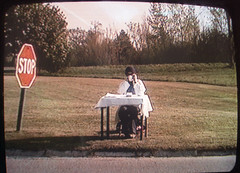They yawned before they revolted
It's morning. Boy is it morning. I am actually sleepier now than when I first got up this morning, which is odd, because I am usually pretty obnoxiously peppy after my run. Maybe I need a third helping of breakfast to kick my brain into gear.
Last night's class was really interesting, but a little weird. The professor was trying to make a pretty sophisticated, but fundamentally simple point: that poverty has less to do with income than with wealth. And I think that the class was with him on this - it's a tough one to argue when you really think about it. No, what got the class going in strange semantic directions was one of James Mills' 1826 writings about the economy post-slavery. Overall, what he was suggesting was that to pay a man to work was the same as owning a slave because in either case you (well, Mills and his cronies) were still owners of what that man created. Paul Samuelson more than 100 years later expands on this by describing labor as the renting of humans.
The professor started out the discussion by asking us to define slavery. Taking into account Mills conclusions about the equivalence of slave labor and paid labor, then we in the working world are all slaves simply because we do not own what we create. I don't have a stake in the scientific experiments I carry out at work, nor do I have "ownership" of anything I might create there, be it physical or conceptual. (The latter is true only to a certain extent)
This seemed to be an itchy spot for the class. I don't know why really, because it seems unfortunately and painfully obvious. Maybe it takes a couple of years of having to work for a living to realize how precious your time and your mental effort are, and sadly, how little we are actually required to think as we become more digested into the machine.
Anti-capitalism in the morning! I think that woke me a bit.
Last night's class was really interesting, but a little weird. The professor was trying to make a pretty sophisticated, but fundamentally simple point: that poverty has less to do with income than with wealth. And I think that the class was with him on this - it's a tough one to argue when you really think about it. No, what got the class going in strange semantic directions was one of James Mills' 1826 writings about the economy post-slavery. Overall, what he was suggesting was that to pay a man to work was the same as owning a slave because in either case you (well, Mills and his cronies) were still owners of what that man created. Paul Samuelson more than 100 years later expands on this by describing labor as the renting of humans.
The professor started out the discussion by asking us to define slavery. Taking into account Mills conclusions about the equivalence of slave labor and paid labor, then we in the working world are all slaves simply because we do not own what we create. I don't have a stake in the scientific experiments I carry out at work, nor do I have "ownership" of anything I might create there, be it physical or conceptual. (The latter is true only to a certain extent)
This seemed to be an itchy spot for the class. I don't know why really, because it seems unfortunately and painfully obvious. Maybe it takes a couple of years of having to work for a living to realize how precious your time and your mental effort are, and sadly, how little we are actually required to think as we become more digested into the machine.
Anti-capitalism in the morning! I think that woke me a bit.



0 Comments:
Post a Comment
<< Home